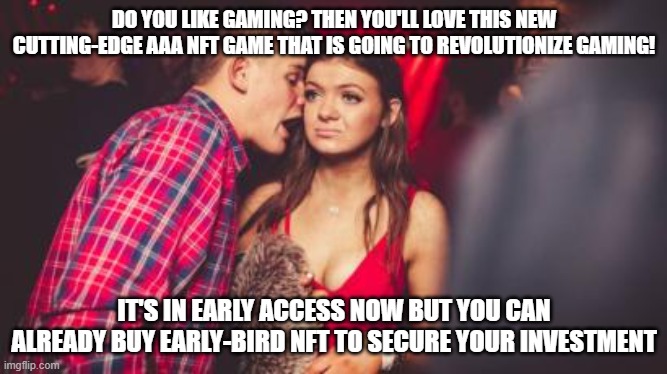Let’s be honest, web3 – and web3 gaming in particular – is notorious for its echo chamber mentality. If you ever heard the term crypto bro, you already know this.
People in web3 game development are talking more and more about how extractive player behavior can harm games. We should also talk about how the extractive behavior of game developers harms the chances of blockchain gaming ever reaching mass adoption.
When there isn’t a well thought-out sustainable game economy in play-to-earn games, and the value of game assets and tokens relies mainly on new players coming in, a game community basically becomes an MLM. Players are desperately trying to attract new people into the ecosystem to save their investment. That’s what a Ponzi scheme game economy does to games in the long run after the hype is gone.

While this situation is less common after the prolonged bear market, this player behavior does not help with mass adoption for crypto games because it looks like a cult to non-crypto native gamers.
But there’s a more insidious problem that still happens often now. And that is overhyping mediocre games. Game developers get stuck in a kind of echo chamber of praise for their mediocre ideas just because it has the word blockchain attached to it.
What is an echo chamber? It’s an environment where a person only encounters information or opinions that reflect and reinforce their own. It’s a bubble of praise with zero criticism and no outside perspective.
Why is that bad? Aren’t people just being supportive? In web3 gaming this issue fosters half-assed cash grab games with boring gameplay and tacked on blockchain integration. We see a rise of early access games that are barely playable but are selling (or trying to sell) gaming NFTs worth hundreds and thousands of dollars.
We see games that look promising but have small chances of success with players because they’ve created impossible expectations.
We see overhyped games in outdated and unpopular genres that expect to gain mass adoption because they were praised so much inside the web3 community.
We see asset flips, barely edited game engine template games, PC exclusive titles with mobile game graphics, fully AI-generated games. And any criticism is branded as FUD.
This might work with the X (formerly known as Twitter) crowd that only looks to buy and flip game tokens; this might look great and innovative inside your echo chambers. But it will most definitely not out-compete non-web3 titles and will not lead to mass adoption. And mass adoption is needed for web3 gaming to continue to exist.
It feels like the bar for web3 games is set very low and there’s a huge gap between game developers and gamers.
How do we fix this?
Create and support communities that provide actual critiques, connect builders in different areas to move the blockchain technology forward and research what works and what doesn’t. Support open source creators. Playtest your games with different communities. Experiment with web3 game models.
There are already communities like this. The Starknet gaming community organizes hackathons, created the Dojo game engine, and supports game developers in many ways. Game7 conducts various web3 gaming research and connects builders to work together, demo and playtest projects. Autonomous Worlds Network, Bibliotheca DAO, Cartridge.gg, Moonstream.to – our work is open source and we build to move web3 games forward and make web3 integration easy and valuable for games.
It’s okay to experiment with game models. It’s good to produce a lot of games to find the best use cases for blockchain technology. But let’s not call half-assed macrotransaction games the future of gaming and expect mass adoption.
